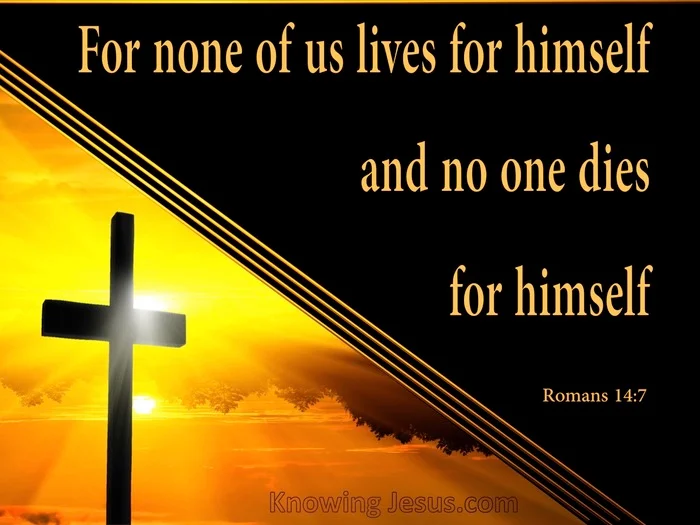We implore the good Lord in this holy Mass to give us a heart of true mercy and forgiveness. Help us to let go of all bitterness and pain we feel. In place of these, give us true love and help us to offer love to others without reserve. Happy Sunday!
DOCTRINE AND FAITH
(SIR 27,33-28.9); PSALM 102 (103); ROMANS 14,7-9; MATT 18,21-35; 24TH SUNDAY, 17TH SEPTEMBER 2023)
“If we live, we live to the Lord, if we die, we die to the Lord. Whether we live or whether we die, we are the Lord's” (Rom 14,8). This belonging (which is not the fruit of our conquest, but of Jesus’ Passover, who died and rose “to be Lord of the dead and the living” (Rom 14,9) is also a belonging to a different horizon, that overturns our most obvious ways of thinking and acting. Being of the Lord means living in a different space, no longer designed by our criteria of discernment, but by his own feeling, in which we are allowed to graft ourselves, like a branch in the vine (cf. John 15, 1-8). A different lymph /liquid flows, therefore, in our veins and gives a new breath to our existence. Jesus reveals it to us through the parable with which he answers Peter's question about forgiveness. “Up to seven times”: it is the measure that Peter imagines in his generosity: and it is already a superabundant measure. In Judaism it was believed that forgiveness should be granted no more than four times. Peter, therefore, goes far beyond this limit. Yet Jesus announces to him a different measure: “Up to seventy times seven” (Matt 18,22). We must not hear in these words only the tone of a strong need; above all there is the power of a gift that is given to us. In fact, Jesus accompanies his answer with the story of a parable, and the parables, we know, not only have the intention of better explaining what Jesus intends to say, they above all have the purpose of revealing how the proximity of the kingdom of God to our life can truly transform us, opening our existence to otherwise unexpected horizons.
The parable that Jesus narrates to Peter revolves around three scenes. In the first, two characters are on stage: a king and his servant, who owes an enormous debt to his lord, ten thousand talents; an astronomical amount even for a king. The king demands the repayment of the debt, but faced with the plea of his servant, he takes pity and forgives everything. In the second scene we find this same servant in relationship with another servant. This time it is he who is the position as the creditor, but the sum is far more modest: only one hundred denarii. However, this servant is not moved and has his unfortunate debtor thrown in prison. This brings us to the third scene, in which the king returns to the scene who, having learned of what has happened, demands the repayment of the previously forgiven debt and has his servant thrown in prison until he has repaid all due.
This is the story told by Jesus. We know it well and it doesn’t surprise us that much. However, let’s pretend, at least for a moment, that we don't know it in all its development. We look at the second scene, as if the first scene had never happened and the parable started from here. Well, the behavior of the servant towards his debtor ends up appearing just to us, or at least understandable. Indeed, it is obvious, according to worldly logic, that a creditor sooner or later demands the repayment of what he has lent. Here there is no case of usury: a sum has been loaned and it is within the creditor's right to ask for its repayment. However, if we re-read this second scene in the light of the first, everything changes! The fact that the first servant received such a generous pardon from his master now makes his behavior towards the other servant absurd, inadmissible, even hateful. What happens in the first picture was supposed to transform, even overturn, what happens in the second.
The way God relates to us must radically transform our way of relating to others. This is the foundation of forgiveness. It's not in my good heart, it's not in the fact that the other deserves it or doesn't deserve it; it lies rather in the fact that God forgives me and his mercy becomes true and effective in my life when it not only erases my sin but generates in me a new life, capable of forgiving as I have been forgiven. If this doesn't happen, we nullify God’s forgiveness in our lives, we make it fruitless. God does not take back his gift, which when it is given, is given forever (because his gifts are irrevocable (cf. Rom ans11,29), but it is our attitude not to welcome him, rather to expel him from the horizon of our existence. Twice, in Jesus’ account, he resounds the expression: “Have patience with me” (Matt 18,26.29); more faithfully we should translate: “Show me the breadth of your heart”. The breadth of God's heart should expand the spaces of our lives, to make them welcoming, free, and available to host the other, even with its load of faults and sins. If this does not happen, our heart, from an open and wide home, becomes narrow and narrow like a prison cell, which imprisons us with the chains of which we are reminded today by Sirach: our acts of revenge, our rancors, our own hatreds. Forgiveness instead, is a school of freedom because it broadens our life according to the breadth of God’s heart. Not up to seven, but up to seventy times seven! + John I. Okoye.
(graphics by Chukwubike)


No comments:
Post a Comment